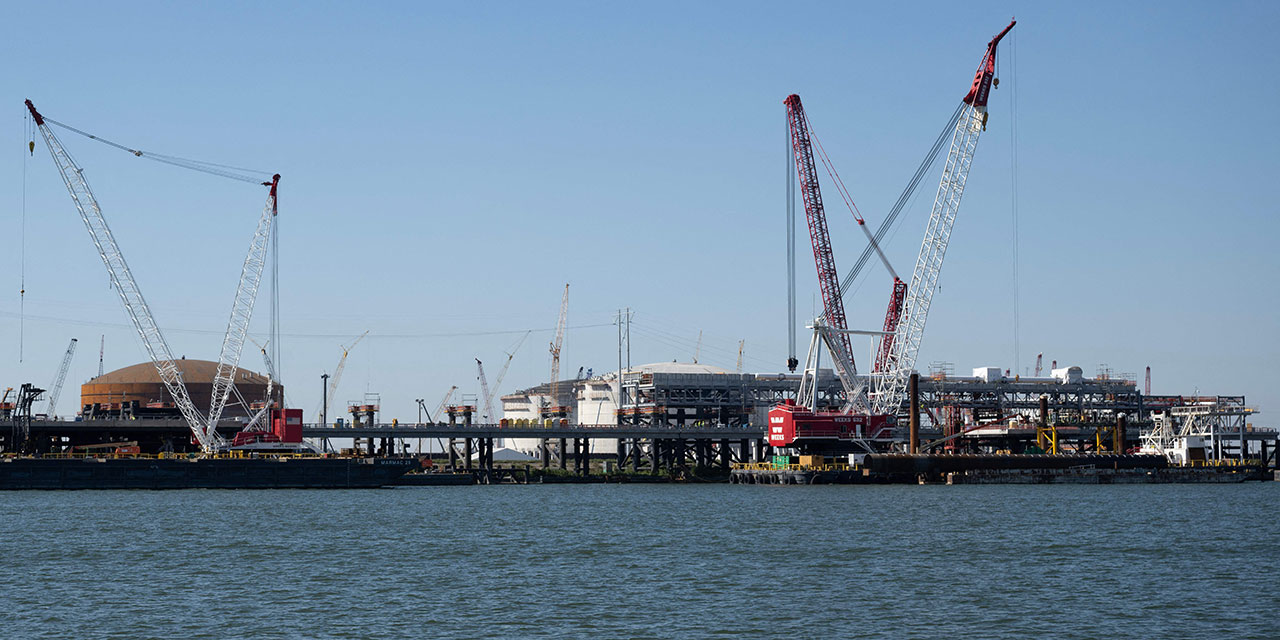
The recent $745 million verdict against Chevron in Plaquemines Parish, in a case involving claims against the energy company for environmental damages, demonstrates how Louisiana’s coastal erosion lawsuits are a dangerous blend of legal overreach, political manipulation, and economic risk. Driven by trial attorneys exploiting a home court advantage, the cases jeopardize energy development and the broader economic health of Louisiana and the United States.
The Supreme Court should grant certiorari in Chevron v. Plaquemines Parish to correct the lower courts’ misapplication of the federal officer removal statute, curb the excesses of these lawsuits, and safeguard America’s energy future—especially under President Trump’s energy dominance agenda.
Finally, a reason to check your email.
Sign up for our free newsletter today.
The pending certiorari petition asks the Supreme Court to resolve a growing split among circuit courts over the federal officer removal statute, 28 U.S.C. §1442(a)(1), and to overturn the Fifth Circuit’s flawed decision to remand these cases to state court. Expanded by a 2011 amendment, the statute allows civil actions “for or relating to any act under color of [federal] office”—that is, actions carried out under federal direction—to be removed from state to federal court.
In this case, Chevron and other petitioners—who want to keep the case in federal court—argue that their World War II-era crude oil production was conducted under federal contracts aimed at producing high-octane aviation gasoline (avgas), a resource critical to the Allied war effort. But a divided Fifth Circuit panel ruled that Chevron’s oil production was “unrelated” to those contracts because the federal government had not explicitly directed the company’s upstream crude extraction, which caused the environmental damage at issue. That decision was upheld in a narrow 7–6 vote denying en banc review.
This ruling revives a “causal-nexus” or “contractual-direction” test that Congress eliminated in 2011 when it modified the statue by adding “relating to” to the statute’s language. Under this narrower approach, removal to federal courts was allowed only if the defendant could show a direct cause-and-effect relationship (causal nexus) by proving that it acted under explicit government instructions (contractual direction). As Judge Andrew Oldham’s dissent highlighted, crude oil is the indispensable raw material for avgas, and Chevron’s production activities were closely tied to its federal obligations.
Most appellate courts have recognized that the 2011 amendment eliminated the causal-nexus requirement, permitting removal for actions “connected or associated” with federal directives. In contrast, the Second and Eleventh Circuits still apply the outdated test, and the Fifth Circuit’s decision adds further confusion by introducing a new “contractual-direction” standard.
The Supreme Court’s intervention is essential to clarify the statute’s scope and to ensure that federal contractors, especially those acting under wartime directives, are shielded from state court bias. The phenomenon of state courts acting unfairly against out-of-state actors to the detriment of interstate commerce as a whole has been recognized as far back as Alexander Hamilton in The Federalist Papers. The Fifth Circuit’s approach undermines Congress’s intent to provide a federal forum for such disputes, potentially discouraging private-sector cooperation with federal priorities. As amici General (Ret.) Richard Myers and Admiral (Ret.) Michael Mullen argued, denying a federal forum could deter firms from responding to the government’s call in times of national need, weakening national defense and energy security.
The Louisiana coastal lawsuits are orchestrated by trial attorneys, led by John Carmouche, who have tilted the playing field through political connections and gamesmanship. Carmouche has capitalized on ties with Louisiana’s Governor Jeff Landry and Attorney General Liz Murrill, both Republicans, to advance these cases. In 2016, then-Attorney General Landry signed a joint prosecution agreement with Carmouche, ceding significant control to private plaintiffs’ lawyers. This agreement, binding the state to reject any defenses raised by defendants, undermines the attorney general’s duty to impartially assess these cases.
Carmouche and his firm have also contributed at least $10,500 to Judge Michael Clement, who presided over the Plaquemines trial. Such contributions raise concerns about impartiality in a state court system already inclined to favor local interests. The plaintiffs’ strategy of filing in rural parishes like Plaquemines exploits this “home court advantage,” where juries may prioritize local concerns over national interests. As former attorney general William Barr’s recent letter to Murrill emphasized, these suits are more about enriching trial lawyers, who stand to gain massive fees from multibillion-dollar settlements, than about genuine environmental restoration.
The $745 million Plaquemines verdict is only the beginning. With interest, costs could exceed $1.1 billion. Plaquemines Parish has 20 other lawsuits pending, and 43 similar cases target oil and gas companies across Louisiana. If the Plaquemines verdict sets a precedent, settlements could reach tens of billions of dollars.
These lawsuits allege violations of Louisiana’s State and Local Coastal Resources Management Act (SLCRMA), claiming that oil production since the 1940s caused coastal erosion, despite SLCRMA’s grandfather clause exempting pre-1980 activities. Undermining the legal foundation for these claims, the Fifth Circuit ruled in New Orleans City v. Aspect Energy that SLCRMA does not apply retroactively to pre-1980 activities. Attorneys argue that pre-1980 operations were not “lawfully commenced” and that post-1980 unpermitted uses trigger liability for decades-old harms—a theory that contradicts the statute’s text and raises constitutional concerns about retroactivity and due process.
These lawsuits also directly undermine President Trump’s energy policy, which prioritizes American energy dominance through expanded domestic production and liquefied natural gas (LNG) exports. On April 9, 2025, Trump issued an executive order, “Protecting American Energy from State Overreach,” which condemns states for imposing “arbitrary or excessive fines through retroactive penalties” on energy producers. The Louisiana lawsuits, seeking billions of dollars for alleged environmental harm from federally directed wartime activities, are precisely the kind of state overreach Trump’s order targets. By threatening massive liabilities, these cases deter investment in Louisiana’s energy sector, particularly in LNG infrastructure critical to expanding export capacity.
Energy Secretary Chris Wright has underscored LNG’s role in national security and meeting the electricity demands of artificial intelligence infrastructure. The Louisiana lawsuits create uncertainty that could stall projects like terminal expansions and new production in the Gulf of Mexico. The Barr letter warns that these suits could constrain funding for Gulf production, hampering Trump’s goal of positioning the U.S. as a global energy leader. Moreover, the retroactive nature of these claims risks punishing companies for lawful actions taken decades ago, contradicting Trump’s push for a stable, business-friendly regulatory environment.
The suits will drive up energy costs for consumers. Companies facing massive liabilities will pass costs onto consumers through higher fuel prices. The threat of retroactive penalties also discourages new investment, further tightening supply and inflating prices. The Pelican Institute estimated in 2019 that Louisiana’s litigation risk has reduced oil well development by between 53 and 74 wells annually, costing the state $44 million to $113 million in economic activity. Consumers will bear the burden as companies divert resources to legal defense and settlements.
Louisiana’s support for these lawsuits signals a hostile business climate that threatens its economic future. The state’s economy has long depended on oil and gas activity, which provides jobs, revenue, and energy security. But the alliance between trial lawyers and political leaders prioritizes short-term expropriation over long-term economic stability.
The Louisiana Mid-Continent Oil & Gas Association warned that the Plaquemines verdict “undermines Louisiana’s position as an energy leader.” Companies may relocate to states with more predictable regulatory frameworks, as Chevron did when it left California’s restrictive environment—only to face similar challenges in Louisiana. Litigation-driven instability could transform Louisiana from an energy hub into a cautionary tale for businesses.
The Supreme Court should grant certiorari to clarify the scope of the federal officer removal statute and shield federal contractors from state court bias. By allowing these cases to proceed in state courts, the Fifth Circuit has set a troubling precedent—one that threatens national energy policy and economic stability. The Court’s intervention is essential to ensure that justice, not local prejudice, prevails.
Photo by ANDREW CABALLERO-REYNOLDS/AFP via Getty Images
Source link















